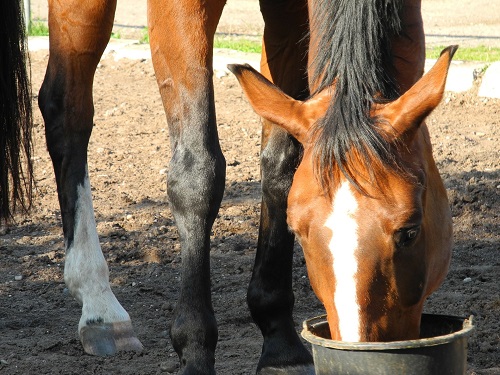
Written by Malcolm Green, Technical Director, EquiFeast

We strongly recommend that you fill in our Free Diet Review Form and let us take you through this process for your specific horses and its issues.
Magnesium is an essential nutrient for horses, but the enthusiasm with which it is added to horse feeds defies all the science – you will find links to the science from other articles in this section. A horse’s Recommended Daily Allowance (RDA) of magnesium can depend on a range of factors. We have summarised these below:
|
Weight of mature horse in work |
Light work (grams per day) |
Moderate work (grams per day) |
Heavy work (grams per day) |
Very Heavy Work (grams per day) |
|
200kg |
3.8 |
4.6 |
6.0 |
6.0 |
|
400kg |
7.6 |
9.2 |
12 |
12 |
|
550kg |
9.5 |
11.5 |
15 |
15 |
|
900kg |
11.4 |
13.8 |
18 |
18 |
If this table does not apply to your horse, further information can be found in Nutrient Requirement of the Horses, 6th Edition, published by the National Research Council, 2007.
Grass, Lucerne and grass hay almost always contain well in excess of the recommended amount of magnesium for horses whatever their work load.
There are a number of reasons why we believe that the vast majority of horses do better with no added magnesium in their diet. In this article, Malcolm Green describes how to create a diet with little or no added magnesium in the UK.
We are also very keen to avoid (mostly) herbal ingredients, technical term GABA Agonists, that hit the same receptor as diazepam (Valium). These have a similar negative impact on the ability of our unique chelated calcium to get the brain working as nature intended. These herbs are becoming more common in British feeds where they are used as flavourings, "calmers" and pain relief. Read more here.
Balancer options
In the UK most balancers are of the feed variety. They enable you to make up your own diet from pasture, hay (various options) and various other ingredients we will discuss below.
At EquiFeast our most popular balancer is:
- CoolCORE - Contains no added artificial magnesium. But does contain the amino acids lysine and methionine, sulphur (MSM), zinc, copper, iodine, selenium and cobalt. Vitamins include A, D3, E, K, C, B1, B2, B6, B12 niacin, pantothenic acid, folic acid, biotin and carnitine plus the chelated calcium from our famous Cool, Calm & Collected. This is by far our most popular balancer.
- CoolCORE itself comes comes pre-combined with a number of other products - CoolCORE DIGEST, CoolCORE BOMBPROOFING, and CoolCORE Mobility. Chat to one of our advisors, or, even better, fill in our Free Diet Review form.
- LamiCORE was designed specifically for horses prone to Laminitis. Recently it has found a great role as the 'GoTo' product for horses needing support for normal muscle function. For those super fussy about sugar and starch there is the zero calorie, pure supplement version LAM Essentials.
So what can you make the rest of the diet up with?
This where our MORE range comes in.
Our primary objective is to turn your pasture and grass hays into good horse feed. So unless your horse has a problem with these feeds, they will make the foundation of the diet. Hay rich in ryegrass, clover and even Lucerne are fine if your pasture is made of native grasses or meadow grasses. But if your paddocks are rich and growing fast you may need to be sourcing some low carbohydrate, high fibre hay to dilute it with. Or some of the “super fibre” options below starting with:
MORE Fibre - Super fibre and less than 7% starch and sugar. More Fibre is a conditioning fibre with a high level of megajoules (calories) but poor doers or those in hard work will need MORE Condition or MORE Work too. These two products are based on crushed sunflower kernels that are great slow release, non heating energy and we balance the omega oils with micronised linseed. They are also an excellent protein source.
Hays from grasses like Timothy and “meadow hay” are probably the safest you can get. Good native grasses are also excellent. But in reality you will normally have to feed whatever is readily available to you locally.
Alfalfa (Lucerne) is a hay that people either love or hate. Generally it is intensively produced so can be very high protein and potassium but it can also be excellent to fill out the feed and make the meal a bit bigger (more for the benefit of the owner than the horse). Dengie and Honeychop both have excellent ranges of products with no added magnesium but sadly both are now adding GABA agonist herbs to many of their products. Stick to their basic/original formulations or use our MORE Chaff.
Another protein boosting option is our product MORE Muscle. It does what is says on the pack!
The feeds above offer a broad range of fibre, energy and protein options enabling horse owners to adjust their diet whether their objective is to build condition or muscle or just provide energy and protein to maintain horses for work. They also provide plenty of low starch, high fibre options to help manage horses prone to laminitis. Talk to us for advice. we are always delighted to help you through the maze of diet creation.
SUMMARY
Formulating with our specially designed CORE&MORE Feeding System will provide all the options you need to create a feeding routine suitable for your horse.
If you need further help, or for a FREE diet review, please contact us.

